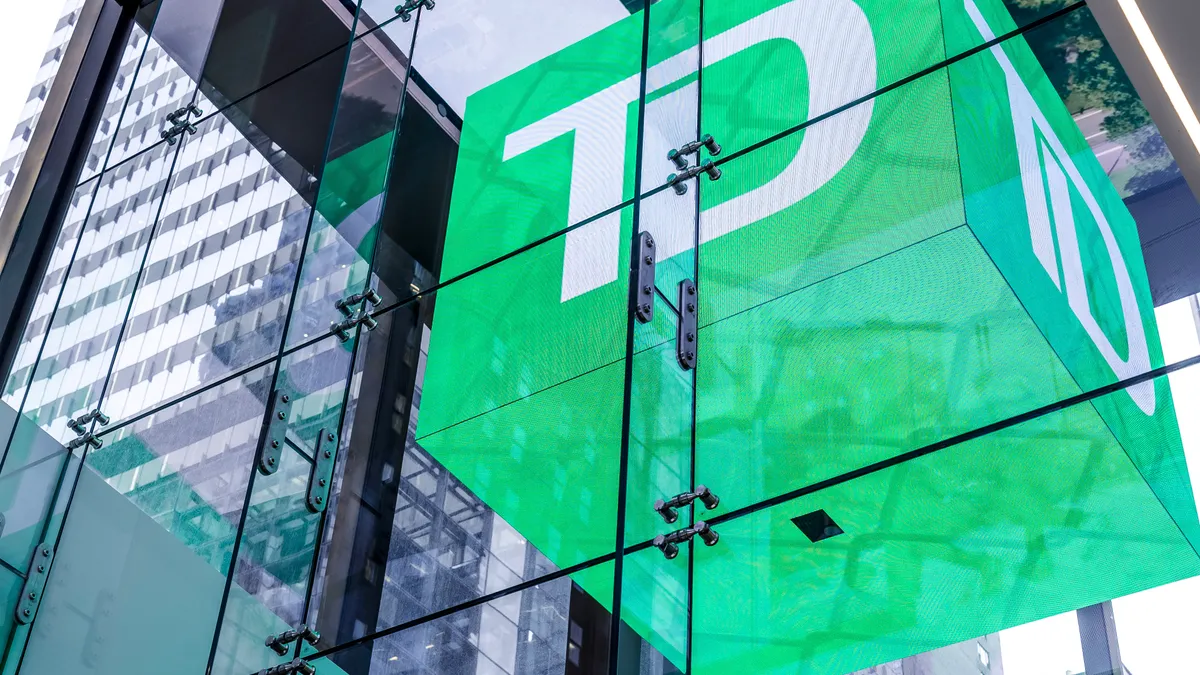TD is setting aside $450 million to cover penalties it expects from one of the three U.S. regulators investigating the bank’s anti-money laundering compliance, along with the Justice Department, the Canadian lender disclosed Tuesday.
TD did not identify the regulator for which the provision is meant — nor the other two regulators investigating. But the bank made clear it “anticipates additional monetary penalties.”
“This provision does not reflect the final aggregate amount of potential monetary penalties or any non-monetary penalties, which are unknown and not reliably estimable at this time,” TD said Tuesday.
Analysts had estimated TD could pay between $500 million and $1 billion in penalties over AML woes that bank executives reportedly knew of as early as November 2022. Rumors that TD’s AML issues torpedoed its proposed acquisition of First Horizon have dogged the Canadian bank for the entire year since the deal was terminated. A successful tie-up would have given TD a jump in its strategy to expand across the Southeastern U.S.
Despite persistent questions from observers, details have been slow to emerge.
“We know what the AML issue is, and we’re making progress in fixing it every day,” TD CEO Bharat Masrani said during a quarterly earnings call in March, without expanding.
At the bank’s annual general meeting last month, Masrani said, “I’ve said to our shareholders as I’ve said today: Be patient, we will be able to share more details on [the AML issues]. But fundamentally, your bank is doing very well.”
Jefferies analyst John Aiken said Tuesday’s disclosure offers “only limited clarity,” according to Bloomberg.
With previous similar cases, Aiken said in a note to clients, it has taken between three to 10 years before consent orders have been lifted.
“We do believe that TD is being proactive and attempting to limit the timeline,” Aiken said in the note, also seen by The Globe and Mail.
But, he added, “the remediation clock has not started ticking.”
TD said last year that it expects to post an adjusted net loss of $200 million to $250 million per quarter in 2024 in its internal corporate segment, largely due to investments in its risk and control infrastructure.
To that end, the bank has bolstered its credentials in the AML sphere, hiring BMO veteran Herbert Mazariegos to serve as its new chief global AML officer. TD hired another BMO alum, Fnan Desta, to serve as associate vice president in AML and head of its Canadian financial intelligence unit. Both executives started in November, according to their LinkedIn profiles.
Around the same time, the bank brought onboard two key people with U.S. regulatory agency experience. It hired Sophia Siddiqui, a former Justice Department and Federal Trade Commission attorney, to be its senior counsel responsible for U.S. regulatory matters, as of November.
The following month, Maryann Kennedy, a 29-year veteran of the Office of the Comptroller of the Currency, joined TD’s board, according to her LinkedIn profile. Kennedy left the OCC in 2021 as senior deputy comptroller for large bank supervision.
In Tuesday’s statement, TD said its “AML program was insufficient to effectively monitor, detect, report and respond to suspicious activity. Work has been underway to remedy these deficiencies.”
The bank can expect to field more AML-related questions — and answer them or not — at its next quarterly earnings call May 23.














